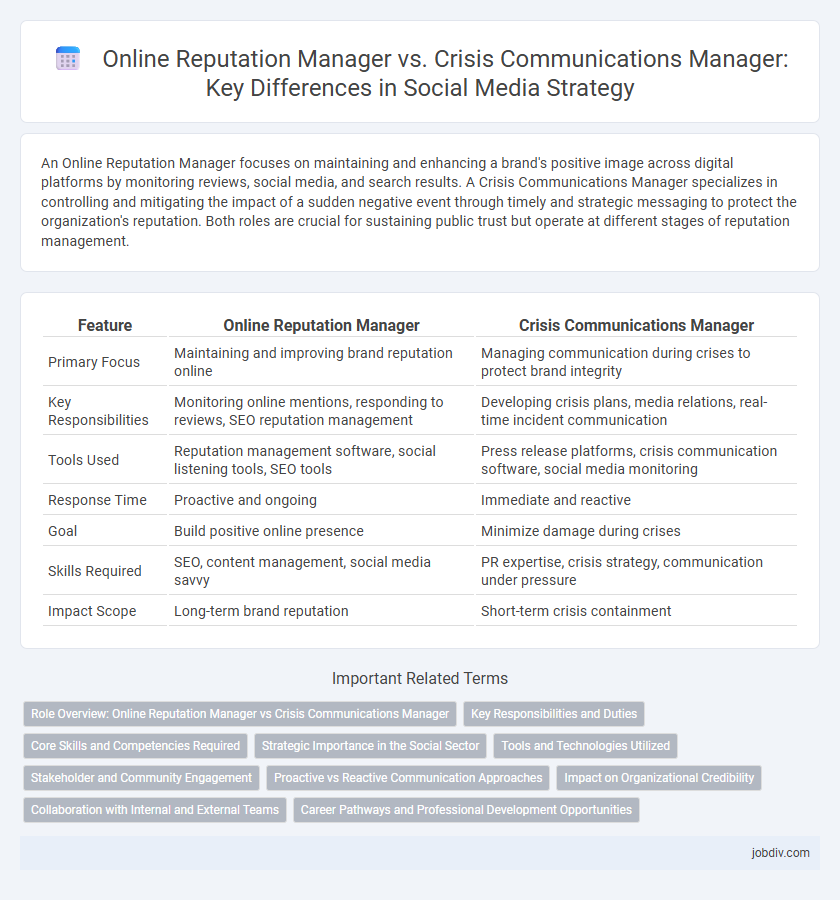An Online Reputation Manager focuses on maintaining and enhancing a brand's positive image across digital platforms by monitoring reviews, social media, and search results. A Crisis Communications Manager specializes in controlling and mitigating the impact of a sudden negative event through timely and strategic messaging to protect the organization's reputation. Both roles are crucial for sustaining public trust but operate at different stages of reputation management.
Table of Comparison
| Feature | Online Reputation Manager | Crisis Communications Manager |
|---|---|---|
| Primary Focus | Maintaining and improving brand reputation online | Managing communication during crises to protect brand integrity |
| Key Responsibilities | Monitoring online mentions, responding to reviews, SEO reputation management | Developing crisis plans, media relations, real-time incident communication |
| Tools Used | Reputation management software, social listening tools, SEO tools | Press release platforms, crisis communication software, social media monitoring |
| Response Time | Proactive and ongoing | Immediate and reactive |
| Goal | Build positive online presence | Minimize damage during crises |
| Skills Required | SEO, content management, social media savvy | PR expertise, crisis strategy, communication under pressure |
| Impact Scope | Long-term brand reputation | Short-term crisis containment |
Role Overview: Online Reputation Manager vs Crisis Communications Manager
An Online Reputation Manager focuses on monitoring and enhancing a brand's digital presence through proactive strategies like content creation, review management, and social media engagement to maintain a positive public image. In contrast, a Crisis Communications Manager specializes in handling urgent, high-impact situations by developing response plans, managing media relations, and mitigating reputational damage during crises. Both roles require strategic communication skills, but the Online Reputation Manager emphasizes long-term brand perception, while the Crisis Communications Manager addresses immediate threat containment and recovery.
Key Responsibilities and Duties
Online Reputation Managers monitor and enhance a brand's digital presence by managing reviews, social media interactions, and search engine results to maintain a positive image. Crisis Communications Managers develop and execute rapid-response strategies during emergencies, coordinating internal teams and media outreach to mitigate reputational damage. Both roles require strategic communication skills, but Online Reputation Managers emphasize proactive reputation building while Crisis Communications Managers focus on reactive damage control.
Core Skills and Competencies Required
An Online Reputation Manager must excel in digital analytics, content creation, and social media monitoring to proactively shape brand perception and respond to feedback across platforms. A Crisis Communications Manager requires expertise in rapid decision-making, strategic messaging, and media relations to effectively manage information flow during high-pressure incidents. Both roles demand strong communication skills, but the former emphasizes continuous engagement while the latter prioritizes contingency planning and crisis response coordination.
Strategic Importance in the Social Sector
Online Reputation Managers play a critical role in shaping public perception by proactively managing social media narratives and digital content to build trust and credibility within communities. Crisis Communications Managers prioritize rapid response strategies during emergencies to contain misinformation and protect organizational integrity in the social sector. Both roles strategically contribute to maintaining stakeholder confidence and safeguarding the social impact of nonprofits, NGOs, and community-based organizations.
Tools and Technologies Utilized
Online Reputation Managers leverage advanced sentiment analysis platforms and social listening tools such as Brandwatch and Mention to monitor brand perception across digital channels. Crisis Communications Managers utilize real-time media monitoring software like Cision and Meltwater to swiftly detect and respond to emerging threats, integrating rapid-response communication platforms for coordinated outreach. Both roles rely on comprehensive analytics dashboards and AI-driven insights to strategize and measure the impact of their efforts effectively.
Stakeholder and Community Engagement
Online Reputation Managers specialize in monitoring and shaping public perception through proactive engagement with stakeholders and communities across digital platforms. Crisis Communications Managers focus on rapid, transparent communication during emergencies to maintain trust and stabilize relationships with key stakeholders and the broader public. Both roles require strategic interaction, but Online Reputation Managers emphasize ongoing dialogue, while Crisis Communications Managers prioritize timely responses to protect community confidence.
Proactive vs Reactive Communication Approaches
An Online Reputation Manager prioritizes proactive communication by continuously monitoring and shaping public perception through strategic content and engagement. A Crisis Communications Manager adopts a reactive approach, swiftly addressing emerging issues to mitigate reputational damage during crises. Both roles require collaboration to balance long-term brand integrity with immediate response effectiveness.
Impact on Organizational Credibility
An Online Reputation Manager actively monitors and shapes public perception through consistent brand messaging and proactive engagement, enhancing organizational credibility over time. In contrast, a Crisis Communications Manager intervenes during critical incidents to mitigate reputational damage and restore stakeholder trust quickly. Both roles are essential, but effective reputation management establishes long-term trust, while crisis communications prevent immediate losses in credibility during emergencies.
Collaboration with Internal and External Teams
Online Reputation Managers coordinate closely with marketing, customer service, and legal teams to ensure consistent messaging and proactive brand monitoring across digital channels. Crisis Communications Managers work alongside PR professionals, executives, and media representatives to develop rapid response strategies and manage sensitive information during high-pressure incidents. Both roles require seamless collaboration with internal departments and external stakeholders to protect and enhance the organization's public image.
Career Pathways and Professional Development Opportunities
Online Reputation Managers specialize in building and maintaining positive digital identities through strategic content management, SEO, and social media engagement, often progressing into roles like Brand Strategist or Digital Marketing Director. Crisis Communications Managers focus on managing organizational responses during emergencies by developing crisis plans, media relations, and stakeholder communication, with career advancements leading to positions such as Corporate Communications Director or Public Relations Vice President. Both career paths demand continuous professional development in media literacy, digital tools, and strategic communication, with certifications like the Certified Online Reputation Manager (CORM) and Crisis Communication Specialist programs enhancing credibility and expertise.
Online Reputation Manager vs Crisis Communications Manager Infographic

 jobdiv.com
jobdiv.com